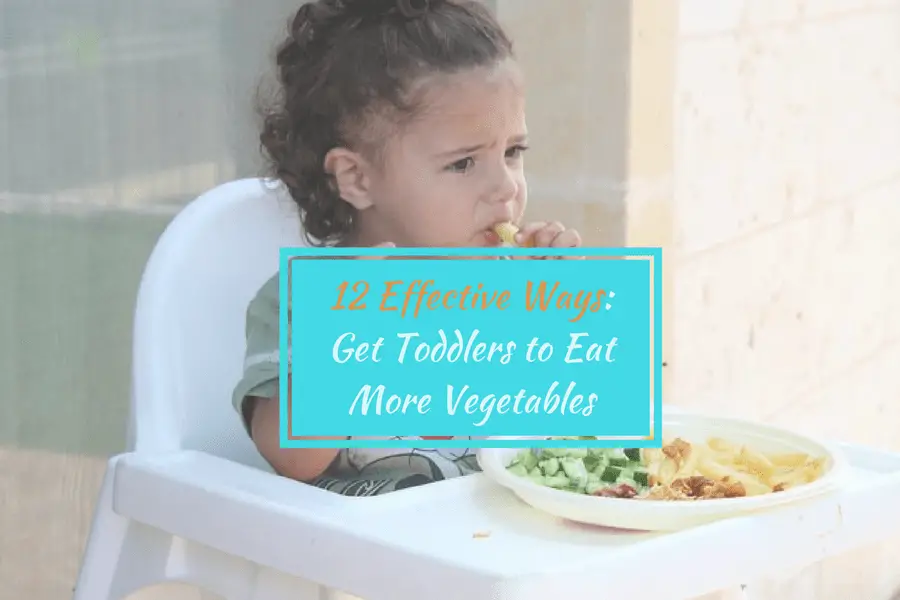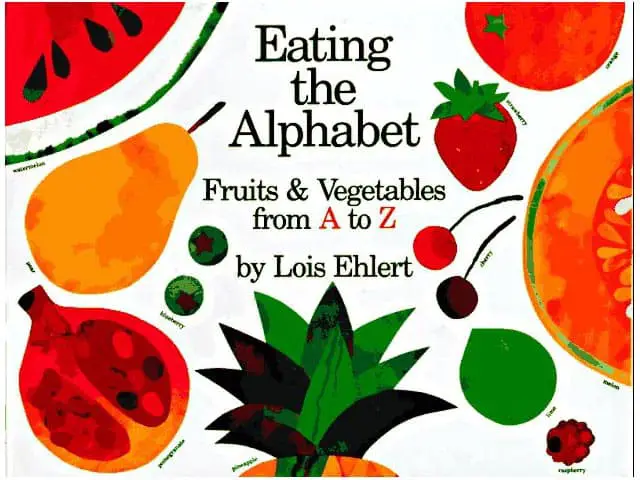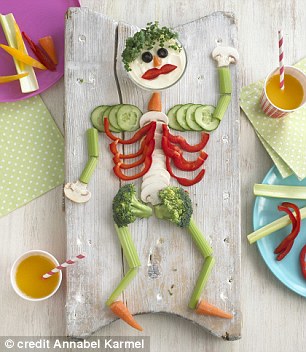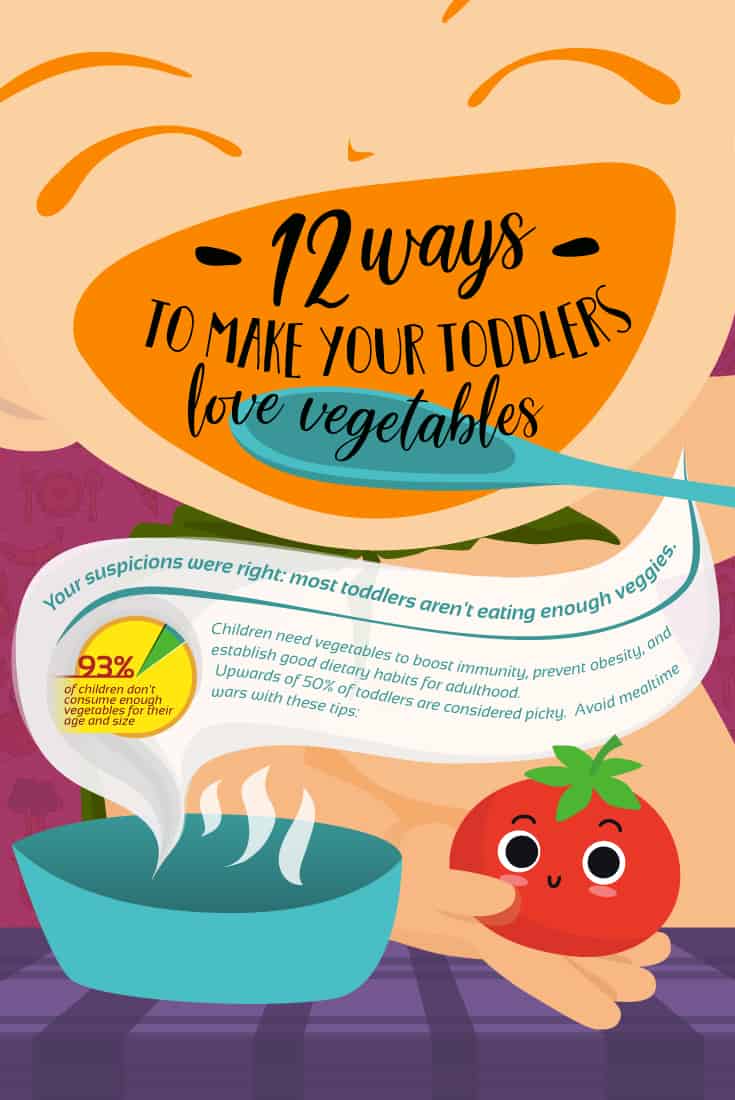As a parent, you know that your child must eat vegetables in order to boost immunity, prevent obesity, and establish good dietary habits for adulthood. Getting toddlers to eat vegetables is not easy, but with a little persistence your toddler could start loving vegetables! (wecll at least a few)
If your toddler won’t eat veggies, you aren’t alone. Picky eating is one of the biggest complaints that parents have and studies back it up. Upwards of 50% of toddlers are picky eaters, and vegetables are the food type they hate the most.
Most Toddlers Are Not Eating Enough Vegetables
If you are worried that your toddler isn’t eating enough vegetables, you are probably right. Statistics show that most children are indeed not meeting recommendations. The CDC found that 93% of children did not eat enough vegetables in 2007-2010!
Remember, it isn’t enough for your toddler to just eat one or two types of vegetables. While this is certainly better than not eating veggies at all, toddlers (and adults) need variety.
There is no “perfect” vegetable that provides all of the vitamins, minerals, phytonutrients, and enzymes needed for a growing toddler. Variety is key!
So how do you get your toddler to eat more vegetables? Here are some scientifically-backed methods that actually work.
1. Use Books about Vegetables
We use books to introduce our children to many concepts in life (such as that infamous “Everyone Poops” book). It turns out that reading about vegetables can also help get your kids to eat them.
A Dutch study of more than 100 toddlers supported that theory. The children were read a book about a rabbit that likes to eat carrots. The children were then split up into several groups. Children who were able to play the most with a rabbit puppet also ate more of the carrots provided as snacks, versus other types of snacks offered.
This correlation has been backed up by other studies in older children, such as this one. The good news is that there are now lots of children’s books about veggies to read your kids.
2. Stop Giving them So Many Snacks
No parent wants their kid to go hungry, which is why we provide them with a variety of snacks. However, this can backfire.
Today’s children get more than 27% of their calories from snacks – which means they aren’t going to be as hungry during mealtimes.
When toddlers aren’t hungry, they aren’t going to be as likely to eat vegetables served. So, if you must offer a snack, make it something healthy like carrot and zucchini sticks with hummus dip.
3. Let Your Toddlers Play with their Food
The old “here comes the rocket ship” trick has been a staple for getting kids to eat their veggies for generations. Now, science backs up how play can help encourage children to eat.
According to Reuters, researchers found that toddles and young kids who played with mushy, slimy foods were more likely to try them and eat them.
Dip and Serve
You can also make eating fun by providing sauces or dips. It seems simple but can be novel for a kid.
If you still aren’t convinced that your toddler should play with his or her food, then consider this other recent study which found that kids who are messy eaters are faster learners. You’ll never say, “don’t play with your food” again!
4. Set a Good Example
The same study found that children were more likely to eat their vegetables when parents were also seen eating them.
Put lots of vegetables on your own plate and make a point to say things like, “I love Brussels sprouts” and “Mmm, all this kale is going to give me energy!”
Setting a good example early on will have big results later on in life teaching your kids good eating habits and making healthy food choices.
5. Hide the Vegetables
Some parents don’t like the idea of hiding vegetables from their toddlers because they feel like it is deception. However, hiding veggies in other foods can help toddlers develop a taste for the food – not to mention remove a lot of mealtime stress.
Here are some recipes using hidden vegetables:
- Put kale in homemade bread
- Broccoli and potato croquettes
- Healthy zucchini brownies
- Cheddar cauliflower tots
- Make green popsicles
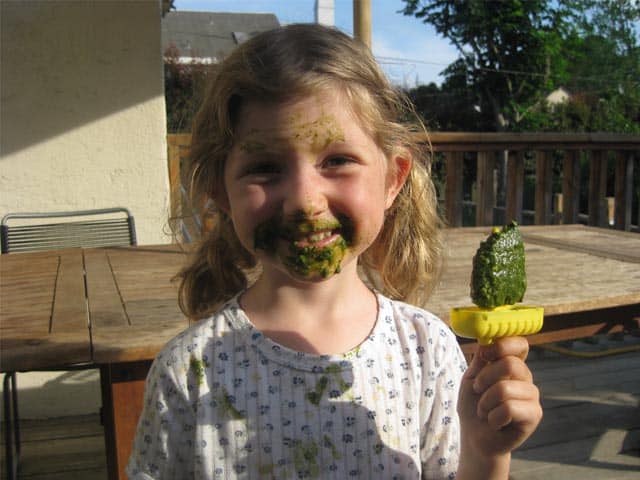
6. Make Green Smoothies
There’s a surprisingly simple formula for making delicious smoothies. Fill a blender with half greens (any leafy greens like spinach/kale, or cucumbers, celery) and half fruit (banana, apple, watermelon), and you have yourself a tasty shake. It’s a bit like green fruit juice.
7. Bribe Your Toddler into Eating Veggies
Bribes can work very well to get your toddler to eat vegetables. However, you have to be careful about how you do it.
If you try to bribe your toddler to eat broccoli by offering cake as a reward, it will only make matters worse as your kid will learn to see veggies as the “yucky” food you only eat to get to the “good” food.
A better tactic is to bribe your kid with healthy food.
As this blogger talks about here, her toddler loves olives. So, at meal times, she would let her child have one olive for each bite of food taken.
If that fails, you can always try non-food bribes such as stickers and toys. It isn’t the best solution, but it works well for a lot of toddlers.
8. Offer Healthy Foods First
Toddlers in particular don’t have much self control, that much is clear. So if you’re going to put their favorite food in front of them next to vegetables, what do you think they will pick?
You may not want every meal to turn into a multi-course meal, but we’ve all seen impatient toddlers try to sit at the dinner table before food is ready. Start them off with vegetable options and you may be surprised at how much they’ve eaten once they get to the “main” meal.
9. Tell A Few Stories
If you have to tell a few tall tales to get your kids to bite, don’t feel bad. Think of it like Santa Claus and the tooth fairy, both well accepted stories children hear.
Their favorite characters can often be role models like Popeye eating spinach, or Tony The Tiger eating fortified breakfast cereal.
A few extra details like “Look how strong Popeye gets!” after eating spinach might just help to convince a child they should be eating leafy greens.
10. Involve Your Child
Children, even toddlers, want to feel empowered to choose. That’s really how these food battlegrounds often get started.
Rather than turning meals into full fledged wars, try to include your child in meal planning or shopping. If it’s something they can assemble, like a wrap or homemade pizza, they can even help with the cooking.
Even if it’s as little as “do you want 2 pieces of broccoli, or 3”, small offers of choices give children a chance to exert some control over the situation.
Having a garden where your child can see where the food comes from and help care for the vegetables may get them in the mood.
11. Make Food Taste Good And Look Good
Toddler taste buds can be as tough to please as the fiercest food critic! Roast vegetables to bring out natural sweetness and flavors, butter up the veggies, or cook with garlic/ginger or sauce.
Food can be cut or shaped an interesting ways, and while this vegetable skeleton may be a bit too much work for a Saturday afternoon, you get the idea.
12.Be Persistent!
Trying to get your toddler to eat vegetables can be a tiring, stressful ordeal. No wonder 90% of caregivers give on offering kids foods they don’t like after only 3 to 5 times.
Remember, it is normal for toddlers to be wary of trying new foods and say that they hate it after just one bite. However, the research shows that kids need to try foods multiple times in order to develop a taste for it.
In this 2007 study, for example, researchers looked at 7-month old children who had already expressed dislike for a vegetable. When the children were given the disliked vegetable for 8 meals on alternating days, 70% of the children eventually started to like the vegetable. In fact, you may have to offer a food 15-20 times before a child will start to like it!
So don’t give up if your toddler doesn’t like a vegetable. Persistence is key to overcoming even the pickiest of eaters!
Conclusion: Stay Positive
If only your child would just eat well and sleep well, that would help you breathe a sigh of relief. The modern parent is under tremendous pressure to get it all right, and to what end? This op-ed goes as far as to say forcing your kids to eat veggies isn’t worth the bother.
Turning mealtime into a standoff is unlikely to improve their diet over the long run. A strong willed child will probably sense extra pressure and resist even more. Pickiness is quite common – all you can do is try your best!
